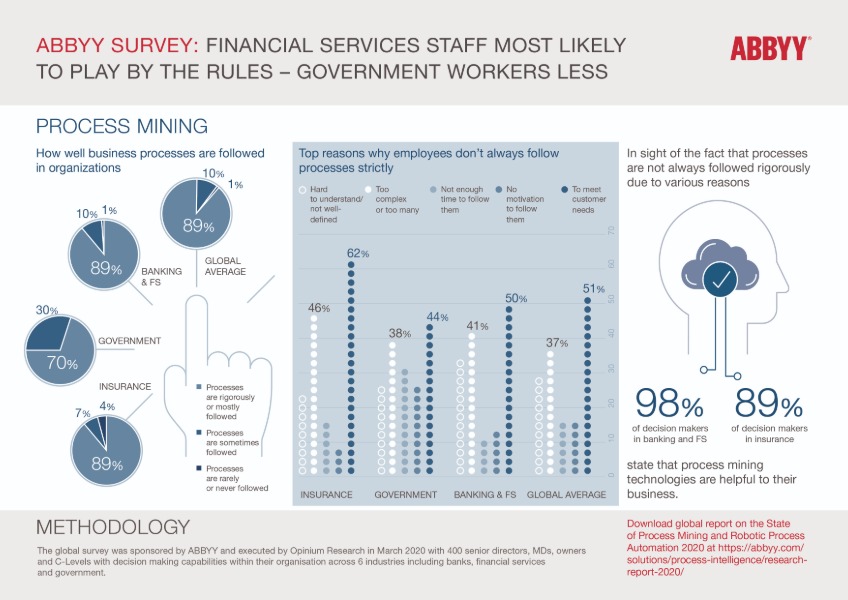
Understanding The Complexities in Organizational Process Management – Lessons From the ABBYY Blog

Understanding The Complexities in Organizational Process Management – Lessons From the ABBYY Blog
Why Process is Such a Big Problem
Reginald J. Twigg
June 15, 2020

A recent survey commissioned by ABBYY asked decision makers across multiple industries – Financial Services, Insurance, Government, for example – how consistently they believed workers followed processes. As one would expect with any survey, results varied by industry, with Financial Services and Insurance scoring pretty high, but most surprising was the comparatively lower scores Government decision makers (leaders) gave their organizations. Specifically, as aggregated across government sectors surveyed (Federal, State, Local), only 15% of leaders believed their staff followed business processes “rigorously” and 30% believed they “sometimes” followed the rules.
The true insights to be gained from this survey are not in pitting one industry’s score against the others but to underscore the fact that ‘process’ continues to be a major problem for industry leaders. Especially problematic, but seldom actually examined, is how well staff – knowledge workers in particular – follow processes or work around them. We can look at the usual causes – old technology, inadequate budget, need to modernize or add more automation – all of which have been a boon for technology providers but have failed to address the problem in any meaningful way.
Perhaps it’s time to start looking at the ‘process problem’ differently?
Government leaders are not unique but make clear what needs to be front and center of conversations about process: people. Processes are made to make people more productive, consistent and accountable, yet they so often are designed and budgeted around data, workflow, training technologies and not on usability. Government workers are knowledge workers, dedicated to solving problems for their constituents. In this context, the data reveal that the three most cited reasons why staff did not follow processes were to meet customer needs (44%), processes are too complex (38%) and not enough time to follow them (31%). This indicates that government employees are willing to take shortcuts in order to meet constituents’ expectations because the processes aren’t working for them.
A Different Look at Process, Mining and Automation
With the widespread adoption of robotic process automation (RPA) tools, a new wave of intelligent document processing and OCR tools, and with growing frequency, Process Mining, comes the expectation that processes can be made to work better with the right technologies. That is true to a point, but if those tools are not deployed with honest understanding of how people – knowledge workers in particular – rely on and use processes to assist their productivity, the results of such investments will be the same as with past technology trends. Instead, looking at processes not just as workflows of events and data but as interactions between people, processes and content can yield a better approach.
Government workers, as a case in point, are case workers who have to make decisions and expert determinations on constituent needs based upon the information gathered in their interactions. This information is gathered from conversations and supporting documents. But their processes are about constantly reviewing these needs and making experienced expert decisions about what the best course of action needs to be. Data automation tools can help with the tasks of collecting, organizing and processing documents and creating workflows for automating steps, but they cannot replace the decision-making and actions knowledge workers need to deliver to their clients. Most process mining approaches are designed to discover the flow of data, events, exceptions and resolutions occur but do not show the knowledge worker behaviors, decision factors and how they use content to inform them.
Process Intelligence is an innovative approach to mining processes to show and understand how humans (knowledge workers and clients) actually interact with them, along with the content needed to make decisions and take actions. Using an organization’s data, but examining it in different ways to show the worker or client’s journey through the processes can reveal time on task, bottlenecks, repetitions, workarounds (where humans have to step out of defined process to get the job done). Oftentimes, bottlenecks occur when a knowledge worker has to review and make decisions on the case, looking at supporting documents and gathering more information.
The data shown here illustrate that government workers do not get adequate decision and action support from their existing processes and systems to facilitate resolution fast enough, so they ‘go around them.’ Not unique to government, the primary reason why so many process automation solutions are failing (RPA, for example, where it is recognized that over 65% of these implementations are failing to achieve their goals) is because they do not adequately address how knowledge workers do their jobs. Process mining can be part of the same problem if it does not focus on work journeys.
Solutions such as Process Intelligence enable organizations to discover, assess, visualize, analyze, and monitor process flows as interactions between people, processes and content. Powered by artificial intelligence and machine learning technologies, Process Intelligence delivers accurate, in-depth and real-time process discovery, analysis, and monitoring, which help automation leaders to accelerate digital transformation initiatives as facilitators of better decisions and customer service instead of just incremental efficiency gains with the status quo.
Learn more about ABBYY solutions for government .
Financial Services Insurance Legal Process Mining

Reginald J. Twigg
Like, share or repost
Share
Subscribe for blog updates
First name*
E-mail*
Сountry*
СountryAfghanistanAland IslandsAlbaniaAlgeriaAmerican SamoaAndorraAngolaAnguillaAntarcticaAntigua and BarbudaArgentinaArmeniaArubaAustraliaAustriaAzerbaijanBahamasBahrainBangladeshBarbadosBelgiumBelizeBeninBermudaBhutanBoliviaBonaire, Sint Eustatius and SabaBosnia and HerzegovinaBotswanaBouvet IslandBrazilBritish Indian Ocean TerritoryBritish Virgin IslandsBrunei DarussalamBulgariaBurkina FasoBurundiCambodiaCameroonCanadaCape VerdeCayman IslandsCentral African RepublicChadChileChinaChristmas IslandCocos (Keeling) IslandsColombiaComorosCongo (Brazzaville)Congo, (Kinshasa)Cook IslandsCosta RicaCroatiaCuraçaoCyprusCzech RepublicCôte d’IvoireDenmarkDjiboutiDominicaDominican RepublicEcuadorEgyptEl SalvadorEquatorial GuineaEritreaEstoniaEthiopiaFalkland Islands (Malvinas)Faroe IslandsFijiFinlandFranceFrench GuianaFrench PolynesiaFrench Southern TerritoriesGabonGambiaGeorgiaGermanyGhanaGibraltarGreeceGreenlandGrenadaGuadeloupeGuamGuatemalaGuernseyGuineaGuinea-BissauGuyanaHaitiHeard and Mcdonald IslandsHoly See (Vatican City State)HondurasHong Kong, SAR ChinaHungaryIcelandIndiaIndonesiaIraqIrelandIsle of ManIsraelITJamaicaJapanJerseyJordanKazakhstanKenyaKiribatiKorea (South)KuwaitKyrgyzstanLao PDRLatviaLebanonLesothoLiberiaLibyaLiechtensteinLithuaniaLuxembourgMacao, SAR ChinaMacedonia, Republic ofMadagascarMalawiMalaysiaMaldivesMaliMaltaMarshall IslandsMartiniqueMauritaniaMauritiusMayotteMexicoMicronesia, Federated States ofMoldovaMonacoMongoliaMontenegroMontserratMoroccoMozambiqueMyanmarNamibiaNauruNepalNetherlandsNetherlands AntillesNew CaledoniaNew ZealandNicaraguaNigerNigeriaNiueNorfolk IslandNorthern Mariana IslandsNorwayOmanPakistanPalauPalestinian TerritoryPanamaPapua New GuineaParaguayPeruPhilippinesPitcairnPolandPortugalPuerto RicoQatarRomaniaRwandaRéunionSaint HelenaSaint Kitts and NevisSaint LuciaSaint Pierre and MiquelonSaint Vincent and GrenadinesSaint-BarthélemySaint-Martin (French part)SamoaSan MarinoSao Tome and PrincipeSaudi ArabiaSenegalSerbiaSeychellesSierra LeoneSingaporeSint Maarten (Dutch part)SlovakiaSloveniaSolomon IslandsSouth AfricaSouth Georgia and the South Sandwich IslandsSouth SudanSpainSri LankaSurinameSvalbard and Jan Mayen IslandsSwazilandSwedenSwitzerlandTaiwan, Republic of ChinaTajikistanTanzania, United Republic ofThailandTimor-LesteTogoTokelauTongaTrinidad and TobagoTunisiaTurkeyTurks and Caicos IslandsTuvaluUgandaUkraineUnited Arab EmiratesUnited KingdomUnited States of AmericaUruguayUS Minor Outlying IslandsUzbekistanVanuatuVenezuela (Bolivarian Republic)Viet NamVirgin Islands, USWallis and Futuna IslandsWestern SaharaZambiaZimbabwe
I have read and agree with the Privacy policy and the Cookie policy .
I agree to receive email updates from ABBYY Solutions Ltd. such as news related to ABBYY Solutions Ltd. products and technologies, invitations to events and webinars, and information about whitepapers and content related to ABBYY Solutions Ltd. products and services.
I am aware that my consent could be revoked at any time by clicking the unsubscribe link inside any email received from ABBYY Solutions Ltd. or via ABBYY Data Subject Access Rights Form .
Referrer
Last name
Query string
Product Interest Temp
UTM Campaign Name
UTM Medium
UTM Source
ITM Source
GA Client ID
UTM Content
GDPR Consent Note
Captcha Score
Page URL
Connect with us
Also read:
- [New] 2024 Approved Optimize Your Video' Written By [Your Name]
- [Updated] Harmony in Sounds Legally Downloaded Meditation Chants & More
- [Updated] In 2024, Navigating Discord's Streaming Features (Desktop/Mobile)
- 2024 Approved The Definitive Guide to Choosing the Best Webcam for Your YouTube Channel
- Boost Web Visibility Instantly Using the Powerful Cookiebot SEO Tech
- Boosting Web Insights with Cookiebot Technology
- Carlsberg Accélère Son Début en Mer Avec La Technologie ABBYY : Un Nouveau Partenariat Industriel
- Cookiebot-Driven Customization: Enhancing User Experience with Personalized Content
- Cookiebot-Driven Performance: Enhancing Your Website's User Engagement
- Facebook’s Reel Strategy: Is It Enough to Dethrone TikTok's Rule?
- Securely Transferring Past Email Data Into LIVE Exchange Server
- Swiftly Conquering French Chromatic Speech
- Updated How to Create Ken Burns Effect? Detaied Steps for 2024
- Title: Understanding The Complexities in Organizational Process Management – Lessons From the ABBYY Blog
- Author: Matthew
- Created at : 2024-10-09 19:28:22
- Updated at : 2024-10-14 18:33:13
- Link: https://solve-popular.techidaily.com/understanding-the-complexities-in-organizational-process-management-lessons-from-the-abbyy-blog/
- License: This work is licensed under CC BY-NC-SA 4.0.
